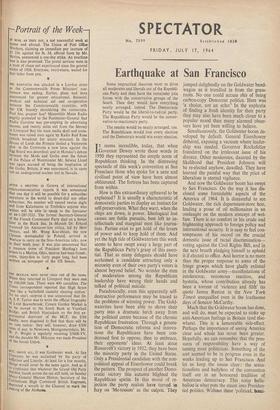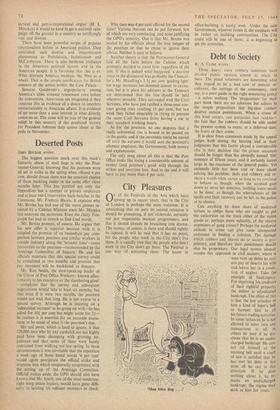Earthquake at San Francisco
Some impractical theorists want to drive all moderates and liberals out of the Republi- can Party and then have the remainder join forces with the conservative groups of the South. Then they would have everything neatly arranged, indeed. The Democratic Party would be the liberal-to-radical party. The Republican Party would be the conser- vative-to-reactionary party.
The results would be neatly arranged, too. The Republicans would lose every election and the Democrats would win every election.
TT seems incredible, today, that when 'Governor Dewey wrote those words in 1950 they represented the simple norm of Republican thinking. In the distressing spectacle of this week's convention at San Francisco those who spoke for a sane and civilised point of view have been almost obliterated. The fortress has been captured from within.
How is this extraordinary upheaval to be explained? It is usually a characteristic of democratic parties to display an instinct for self-preservation. What they want, when the chips are down, is power. Ideological lost causes are futile pursuits, best left to in- tellectuals and marginal men like journa- lists. Parties exist to get hold of the levers of power and to keep hold of them. And yet the high tide of Goldwaterism this week seems to have swept away a large part of the Republican Party's grasp of this essen- tial. That so many delegates should have acclaimed a candidate attracting only a minority even of their own party's voters is " almost beyond belief. No wonder the men of moderation among the Republican leadership have wrung their hands and talked of political suicide.
Paradoxically, even this apparently self- destructive performance may be traced to the problems of winning power. The Gold- waterites have been able to shove their party into a dramatic lurch away from the political centre because of the chronic Republican frustration. Through a genera- tion of Democratic reforms and innova- tions the Republicans have been con- demned first to oppose, then to embrace, their opponents' ideas. At least since Roosevelt's victory in 1932, they have been the minority party in the United States. Only a Presidential candidate with the non- political appeal of Eisenhower could break the pattern. The prospect of another Demo- cratic victory this autumn blighted the Republican spirits. In this mood of re- jection the party zealots have turned in fury on 'Me-tooism' as the culprit. They jumped delightedly on the Goldwater band- wagon as it trundled in from the grass- roots. No one could accuse this of being carbon-copy Democrat politics. Here was 'a choice, not an echo.' In the euphoria of finding a fresh identity for their party they may also have been much closer to a popular mood than many alarmed obser- vers have yet been willing to believe.
Simultaneously, the Goldwater boom de- veloped by default. General Eisenhower dithered, exposing a vacuum where leader- ship was needed. Governor Rockefeller foundered on the irrelevant issue of his divorce. Other moderates, daunted by the likelihood that President Johnson will be re-elected anyhow, dawdled. They have learned the painful way that the price of liberalism is eternal vigilance.
And now the Goldwater boom has swept to San Francisco. On the way it has dis- closed some formidable aspects of the America of 1964. It is distasteful to see Goldwater, the rich department-store heir, leading a posse of oil millionaires in an onslaught on the modern concept of wel- fare. There is no comfort in his crude and frightening approach to foreign policy and international security. It is easy to feel con- temptuous of his record on the crucial domestic issue of racial discrimination— voting against the Civil Rights Bill, and in the next breath pledging himself to uphold it if elected to office. And horror is no more than the proper response to some of the fringe groups which have gladly enlisted in the Goldwater army—manifestations of intolerance, venomous reaction, and hysteria, whose contribution already has been a torrent of 'violence and filth' (to quote James Reston in the New York Times) unequalled even in the loathsome days of Senator McCarthy.
Much that the Goldwater boom has done, and will do, must be expected to stoke up anti-American feelings in Britain (and else- where). This is a lamentable side-effect. Perhaps the importance of seeing America clear and whole has never been greater. Hopefully, we can remember that the pres- sures of responsibility have a way of taming most politicians. Something of the sort seemed to be in progress even in the weeks leading up to San Francisco. And let us keep the issues clear : • the sensa- tionalism and ballyhoo of the convention itself are in an honoured tradition of American democracy. This noisy hulla- balloo is what puts the steam into Presiden- tial politics. Without these 'political, homi- lectical and patrio-inspirational orgies' (H. L. Mencken) it would be hard to get a national cam- paign off the ground in a country so terrifyingly vast and diverse.
There have been powerful surges of popular emotionalism before in American politics. They nourished such diverse and impermanent phenomena as Prohibition, Isolationism and McCarthyism. There is also immense resilience in the American political system and in the American people. It is fortunate that this is so. What distracts America weakens the West as a whole. That is the simple justification for British concern at the antics within the Cow Palace.
Senator Goldwater's unpopularity among America's allies aroused resentment even before the convention. Americans are misguided if they construe this as evidence of a desire to interfere unwarrantably in American affairs. It is evidence of no more than a sane interest in what directly concerns us. The same will be true of the general relief in this country if the predicted victory for President Johnson duly comes about at the polls in 'November.

























 Previous page
Previous page